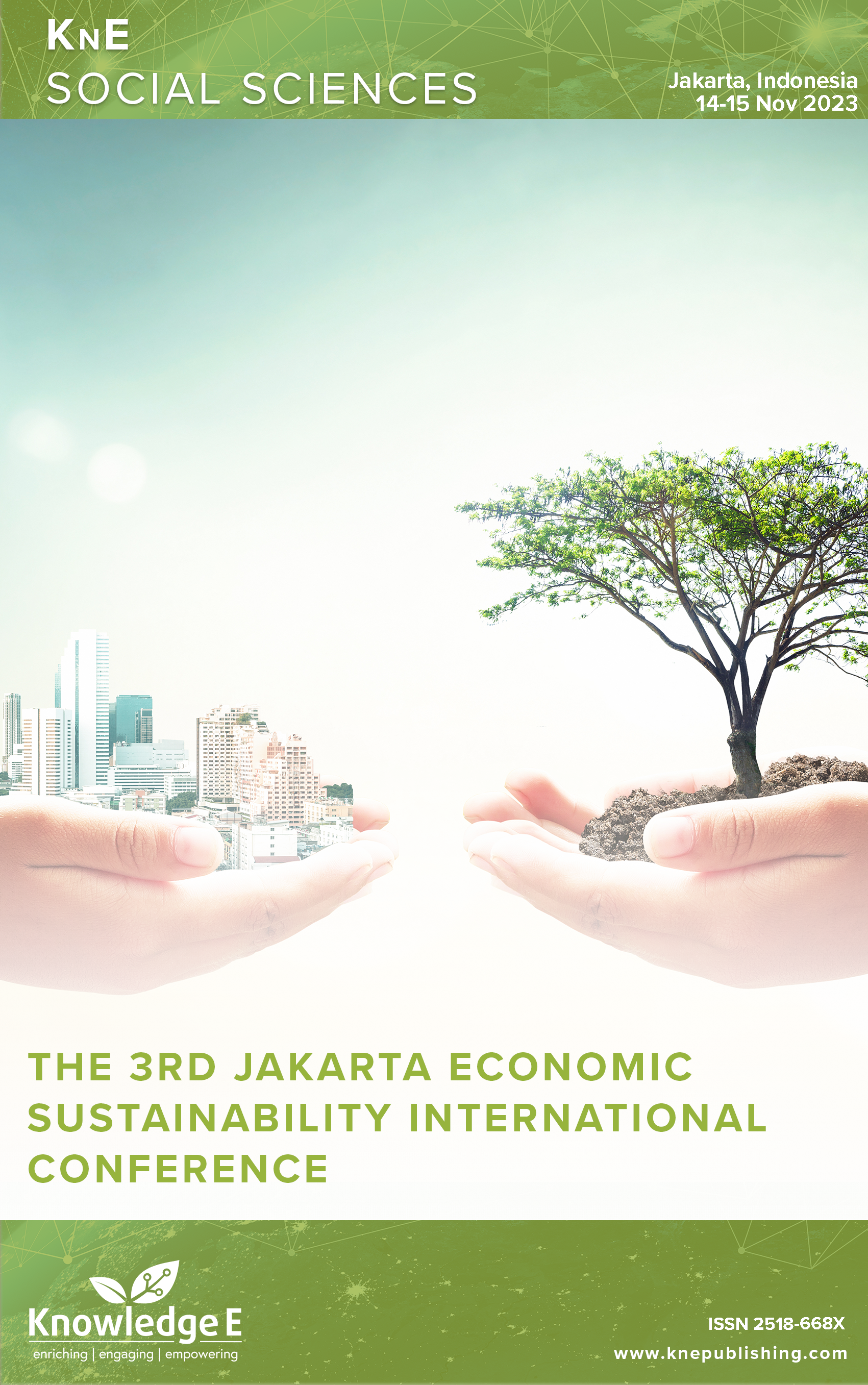The Essence of Halal Ecosystem in Pesantren Business in Optimizing Toward Sustainable Economy
DOI:
https://doi.org/10.18502/kss.v9i20.16552Abstract
In the era of globalization, the halal product market has grown to become a significant contributor to the global economy. Pesantren is the ideal place for the implementation of the halal system. This is also supported by the territory of Indonesia, which is a majority Muslim community, so that Halal is not only an important aspect of Islamic teachings but also a necessity. One of the most important halal needs is to pay attention to food and beverages. The halal sector promotes the idea of goodness for consumption as a guarantee of the highest quality of goods and services. The purpose of industrial economics is to explain the ways of development in the economic sector, for the halal industry in Pesantren to have an economic impact on Pesantren and the surrounding community. The research method uses qualitative with a descriptive inductive approach. The study results show that business units in Islamic boarding schools, such as Roya always maintain the quantity and quality of halal both from products, systems, services, and human resources so as to optimize halal value impacting sustainable economy. The sustainable impact can be felt directly by the big family of the Pesantren, and also the Pesantren workers taken from the community around the cottage in order to feel the blessing of halal cycle.
Keywords: business unit of Pesantren, halal industry, halal, products
References
Nasution LZ. Penguatan industri halal bagi daya saing wilayah: Tantangan dan agenda kebijakan [Strengthening the halal industry for regional competitiveness: Challenges and policy agenda]. Journal of Regional Economics Indonesia. 2020;1(2):33-57. https://doi.org/10.26905/jrei.v1i2.5437. (Indonesian) DOI: https://doi.org/10.26905/jrei.v1i2.5437
Waharini FM, Purwantini AH. Model pengembangan industri halal food di Indonesia [Halal food industry development model in Indonesia]. Muqtasid. 2018;9(1):1-13. https://doi.org/10.18326/muqtasid.v9i1.1-13. (Indonesian) DOI: https://doi.org/10.18326/muqtasid.v9i1.1-13
Riya J, Dzikrullah D. Identifikasi halal food pada proses produksi menggunakan analisis SWOT (Metode multicase studi) [Identification of halal food in the production process using SWOT analysis (multicase study method)]. Maro: Jurnal Ekonomi Syariah dan Bisnis. 2021;4(2):119-142. https://doi.org/10.31949/maro.v4i2.1700. (Indonesian) DOI: https://doi.org/10.31949/maro.v4i2.1700
Hervina H. Trend halal food di Kalimantan Timur [Halal food trend in East Kalimantan]. Fenomena. 2017;9(2):175-186. https://doi.org/10.21093/fj.v9i2.1295 176. (Indonesian)
Zakiah S. Teori konsumsi dalam perspektif ekonomi Islam [Consumption theory from an Islamic economic perspective]. El-Ecosy: Jurnal Ekonomi dan Keuangan Islam. 2022;2(2):151. https://doi.org/10.35194/eeki.v2i2.2515. (Indonesian) DOI: https://doi.org/10.35194/eeki.v2i2.2515
Dahlan AR. Ushul Fiqh. Jakarta: Sinar Grafika Citra; 2010. (Indonesian)
Qardhawi MY. Halal Wal Haram Fil Islam [Halal and haram in Islam]. Surabaya: PT. Bina Ilmu; 1980. (Indonesian)
Sulistiani SL. Analisis maqashid syariah dalam pengembangan hukum industri halal di Indonesia [Analysis of sharia maqashid in the development of halal industrial law in Indonesia]. Law and Justice. 2018;3(2):91-97. https://doi.org/10.23917/laj.v3i2.7223. (Indonesian) DOI: https://doi.org/10.23917/laj.v3i2.7223
Sukoso, Wiryawan A, Kusnadi J, Sucipto. Ekosistem industri halal [Halal industrial ecosystem]. Jakarta: Departemen Ekonomi dan Keauangan Syariah; 2020. (Indonesian)
Nurrahma A. Pengembangan hukum industri halal di Indonesia [Development of halal industry law in Indonesia,Internet]. Makassar: Universitas Islam Negeri Alauddin; 2021, July 7. Available from: https://doi.org/10.31219/osf.io/sxr43. (Indonesian) DOI: https://doi.org/10.31219/osf.io/sxr43
Awaludin L. Ummul Mukminin. Jakarta: Wali; 2020. (Indonesian)
Bakar A, Pratami A, Sukma AP. Analisis fiqih industri halal [Analysis of halal industry jurisprudence]. Jurnal Tausiah FAI UISU. 2021;11(1):1-13. (Indonesian)
Khizanatuallah. Wardun: Warta Dunia Pondok Modern Darussalam Gontor [Wardun: World News of Pondok Modern Darussalam Gontor,Internet]. Ponorogo: Pondok Modern Darusslam Gontor; 2021, Januari 26. Available from: https://gontor.ac.id/warta-dunia-wardun-2021/. (Indonesian)
Madjid SS. Analisis peluang, tantangan dan strategi industri halal di Indonesia (pada masa pandemic covid-19) [Analysis of opportunities, challenges and strategies for the halal industry in Indonesia (during the Covid-19 pandemic)]. Journal Pilar. 2022;13(1):17-32. (Indonesian)
Komite Nasional Ekonomi dan Keuangan Syari’ah. Strategi Percepatan Ekspor Produk Halal Usaha Kecil dan Menengah Indonesia [Strategy for Accelerating Exports of Halal Products for Indonesian Small and Medium Enterprises]. Jakarta: Komite Nasional Ekonomi dan Keuangan Syari’ah; 2021. (Indonesian)
Fitri YY, Fasa MI, Suharto. Pengaruh kepuasan konsumen terhadap laju perkembangan industri produk makanan dan minuman halal Indonesia [The influence of consumer satisfaction on the rate of development of the Indonesian halal food and beverage product industry]. Jurnal Bina Bangsa Ekonomika. 2022:15(1):122- 129. https://doi.org/10.46306/jbbe.v15i1.128. (Indonesian) DOI: https://doi.org/10.46306/jbbe.v15i1.128
Yulia L. Strategi pengembangan industri produk halal [Halal products industry development strategy]. Jurnal Bimas Islam. 2015;8(1):121-162. (Indonesian)
Ngatinah N, Isnaeni N, Lubis P. Analisis potensi pengembangan produk fesyen muslim dalam upaya mendukung industri halal fesyen [Analysis of the potential for developing Muslim fashion products in an effort to support the halal fashion industry]. Najaha Iqtishod: Journal of Islamic Economic and Finance. 2022;3(3):168- 177. (Indonesian)
Hida FT, Basalamah R, Nurhadayati. Analisis manajemen industri halal perspektif ekonomi Islam [Analysis of halal industry management from an Islamic economic perspective]. Jurnal Reflektika. 2021;16(1):49-68. (Indonesian) DOI: https://doi.org/10.28944/reflektika.v16i1.541
Ashari R. Pengembangan sistem logistik produk halal di Indonesia [Development of a halal product logistics system in Indonesia]. Halal Research. 2021;1:8-19. (Indonesian) DOI: https://doi.org/10.12962/j22759970.v1i1.13
Pangestu P. Pengaruh preferensi konsumen terhadap keputusan pembelian pada kantin halalan thayyiban Universitas Brawijaya Malang [The influence of consumer preferences on purchasing decisions at the thayyiban halalan canteen, Brawijaya University, Malang]. Jurnal Ilmiah Mahasiswa FEB. 2017;6(1):1-16. (Indonesian)
Muis ARC. Apa itu rantai nilai halal dan bagaimana potensinya [What is a halal value chain and what is its potential,Internet]. Indonesia: The Conversation; 2022, Desember 13. Available from: https://theconversation.com/apa-itu-rantai-nilai-halaldan- bagaimana-potensinya-196279. (Indonesian)

